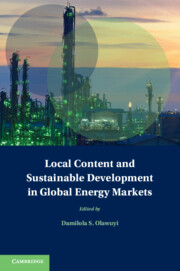Book contents
- Local Content and Sustainable Development in Global Energy Markets
- Reviews
- Treaty Implementation for Sustainable Development
- Local Content and Sustainable Development in Global Energy Markets
- Copyright page
- Contents
- Preface and Acknowledgements
- Abbreviations
- Editor
- Contributors
- Part I Introductory Context and Principles
- 1 Local Content and the Sustainable Development Nexus
- 2 Defining the ‘Local’ in Local Content Requirements in the Oil and Gas Sector
- 3 Local Content Measures and the WTO Regime: Addressing Contentions and Trade-offs
- 4 Local Content Requirements in Extractive Industries: A Human Rights Analysis
- 5 Upgrade of Local Suppliers in the Global Production Network: The Success or Otherwise of Local Content Regimes
- Part II Case Studies
- Part III Lessons Learned and Future Directions
- Index
2 - Defining the ‘Local’ in Local Content Requirements in the Oil and Gas Sector
from Part I - Introductory Context and Principles
Published online by Cambridge University Press: 05 March 2021
- Local Content and Sustainable Development in Global Energy Markets
- Reviews
- Treaty Implementation for Sustainable Development
- Local Content and Sustainable Development in Global Energy Markets
- Copyright page
- Contents
- Preface and Acknowledgements
- Abbreviations
- Editor
- Contributors
- Part I Introductory Context and Principles
- 1 Local Content and the Sustainable Development Nexus
- 2 Defining the ‘Local’ in Local Content Requirements in the Oil and Gas Sector
- 3 Local Content Measures and the WTO Regime: Addressing Contentions and Trade-offs
- 4 Local Content Requirements in Extractive Industries: A Human Rights Analysis
- 5 Upgrade of Local Suppliers in the Global Production Network: The Success or Otherwise of Local Content Regimes
- Part II Case Studies
- Part III Lessons Learned and Future Directions
- Index
Summary
While there has been a massive proliferation of Local Content Requirements (LCRs) especially in the oil and gas sector, there is little critical analysis of how ‘local’ has been understood in various jurisdictions. This chapter reviews a number of legal and policy provisions of local content in multiple jurisdictions around the world and finds that most jurisdictions have adopted a centralist or national approach that defines local content in terms of first consideration being given to their ‘nationals’. There is scarcely any reference to the local populations around the localities where the resources are located. This chapter argues that such an approach limits the capacity of LCR to be utilised to address broader economic development challenges. Given that revenues from oil and gas resources are managed by national governments (in most jurisdictions), a nuanced approach to LCRs that recognises the historical grievances of local resource communities can provide a mechanism for meeting the demands of those communities and other subnational stakeholders, such as states/provinces and local governments.This will in turn enhance the capacity of companies to obtain the social license to operate from their host communities.
- Type
- Chapter
- Information
- Publisher: Cambridge University PressPrint publication year: 2021

